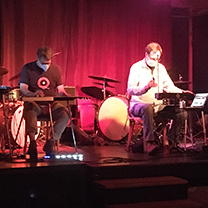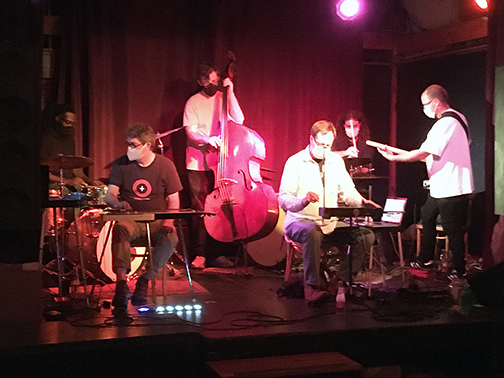September 21, 2021
Live @ The Pilot Light - Duet for Theremin & Lap Steel w/ friends
 Date: September 20, 2021
Date: September 20, 2021
Venue: The Pilot Light, Knoxville, Tennessee
links:
Until recently, the staff of the Poison Pie Publishing House had little previous exposure to the Duet for Theremin & Lap Steel, except for listening to the self-released album, 10, which we liked so much we included it in our top ten records of 2018.
However, there remains among our number an ardent fan of the theremin. Each fall semester, when the course, The Golden Age of Non-Idiomatic Improvisation, is taught on the Knoxville campus of the University of Tennessee, the instructor brings his twentieth-century Big Briar Etherwave theremin to class and introduces the students to it. This they did again not two weeks ago, watching youtube videos of Clara Rockmore and letting the students have a little hands-on (or more accurately hands-off) experience. (The theremin has proved an adaptable instrument for the pandemic since it requires social distancing and is incapable of spreading contagion via contact.)
About a month ago, as we prepared for class, we sauntered over to the bandcamp page of the Duet for Theremin & Lap Steel and discovered there were two new releases out, a double cd, 'Oumuamua (2021) and a single cd Halocline (2020). We ordered the cds and received, in addition to the music, an email from the theremin player, Scott Burland, alerting us to their upcoming visit to The Pilot Light in Knoxville, Tennessee, the stomping grounds of the staff of the PPPH. So, while we enjoyed repeated listenings of 'Oumuamua and Halocline, we anticipated attending our first concert since the onset of the COVID-19 pandemic.
Monday night finally arrived and we made sure to be prompt for the 7:00 opening of the doors. As it turned out, there was an opening quartet composed of two drummers and two bassists, one acoustic and one electric. Unfortunately, these players shall have to remain anonymous in this review, as we cannot find any advertisements on the internet with which to identify them, except for a note about the Matt Nelson Trio, which does not numerically correspond to the event that we witnessed. They warmed up the modest crowd by navigating through a territory lying on the borders of minimalism and jazz.
Then Scott Burland and Frank Schultz (lap steel) took the stage. They played a short but sweet set composed of a single piece in which the theremin and lap steel were electronically filtered through a variety of pedals and computers to forms a blanketing wash of improvised sound. Well, that was what we had come to see and we were quite happy to have seen them perform in person. However, the highlight of the night was yet to come.
All six musicians then managed to situate themselves on the rather cozy stage and performed two extended pieces. In a very short span of time, the musicians fell into sync. The tapping of the two drums, the thrumming of the acoustic bass and the popping of the electric bass found their places amidst the soundscape generated from theremin and lap steel. The volume rose considerably and we were glad to have our habitual ear plugs in place. Quite a lovely conversation between improvisers was on display at the Pilot Light. We will not say that it was a pity that so few witnessed the spectacle because an intrinsic quality of the music is that it thrives in the absence of a throng.

It is a poorly kept secret that the true subject of our class, The Golden Age of Non-Idiomatic Improvisation, is the investigation of mechanisms with which individuals find the courage to create in unconventional directions. Improvised music is a commendable vehicle to carry and propel the discussion. Each individual musician whom we study has their own path. Ornette Coleman strove for complete self-definition. Cecil Taylor claimed he was motivated by a spiritual force that would kill him if he stopped making music, as it had his uncle. For Derek Bailey, improvisation was a tool to investigate the world. He said, "My whole life story is really a strenuous attempt to push back this colossal ignorance I've always carried around with me." Amina Claudine Myers, George Lewis and other members of the AACM drew strength from a nurturing community that encouraged the expression of individual voices.
What came to pass last night at the Pilot Light was in no way inferior to these other examples. It was in fact a unique declaration and demonstration of the unstoppable compulsion that prompts individuals to devote non-negligible portions of their lives to improvisational endeavors without which the beauty of the music that we heard could not exist.

